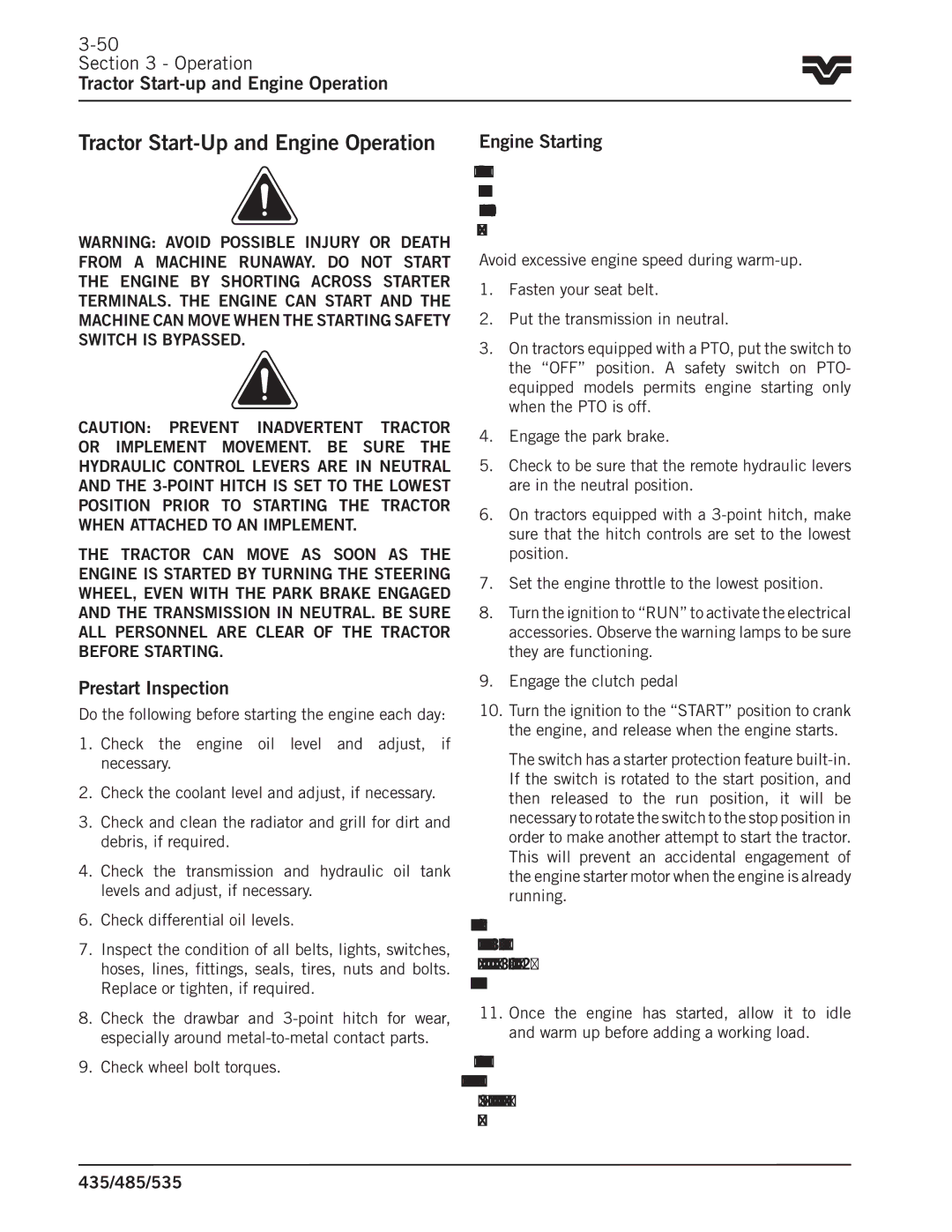
Section 3 - Operation
Tractor Start-up and Engine Operation
Tractor Start-Up and Engine Operation
WARNING: AVOID POSSIBLE INJURY OR DEATH FROM A MACHINE RUNAWAY. DO NOT START THE ENGINE BY SHORTING ACROSS STARTER TERMINALS. THE ENGINE CAN START AND THE MACHINE CAN MOVE WHEN THE STARTING SAFETY SWITCH IS BYPASSED.
CAUTION: PREVENT INADVERTENT TRACTOR OR IMPLEMENT MOVEMENT. BE SURE THE HYDRAULIC CONTROL LEVERS ARE IN NEUTRAL AND THE
THE TRACTOR CAN MOVE AS SOON AS THE ENGINE IS STARTED BY TURNING THE STEERING WHEEL, EVEN WITH THE PARK BRAKE ENGAGED AND THE TRANSMISSION IN NEUTRAL. BE SURE ALL PERSONNEL ARE CLEAR OF THE TRACTOR BEFORE STARTING.
Prestart Inspection
Engine Starting
IMPORTANT: Protect the turbocharger during start- up by not opening the throttle or accelerating above 1000 RPM until the engine oil bar graph reads in the normal range.
Avoid excessive engine speed during
1.Fasten your seat belt..
2.Put the transmission in neutral..
3.On tractors equipped with a PTO, put the switch to the “OFF” position.. A safety switch on PTO- equipped models permits engine starting only when the PTO is off..
4.Engage the park brake..
5.Check to be sure that the remote hydraulic levers are in the neutral position..
6.On tractors equipped with a
7.Set the engine throttle to the lowest position..
8.Turn the ignition to “RUN” to activate the electrical accessories.. Observe the warning lamps to be sure they are functioning..
9.Engage the clutch pedal
Do the following before starting the engine each day:
1.Check the engine oil level and adjust, if necessary..
2.Check the coolant level and adjust, if necessary..
3.Check and clean the radiator and grill for dirt and debris, if required..
4.Check the transmission and hydraulic oil tank levels and adjust, if necessary..
6.Check differential oil levels..
7.Inspect the condition of all belts, lights, switches, hoses, lines, fittings, seals, tires, nuts and bolts.. Replace or tighten, if required..
8.Check the drawbar and
9.Check wheel bolt torques..
10.Turn the ignition to the “START” position to crank the engine, and release when the engine starts..
The switch has a starter protection feature
IMPORTANT: To prevent starter motor damage, never crank the engine for more than 30 seconds. If the engine does not start within 30 seconds, wait 2 minutes to cool the starter motor before recranking.
11.Once the engine has started, allow it to idle and warm up before adding a working load..
IMPORTANT: Pay attention to the warning light bar and electronic monitor for any indication of a problem. Stop the tractor immediately and investigate the problem.
